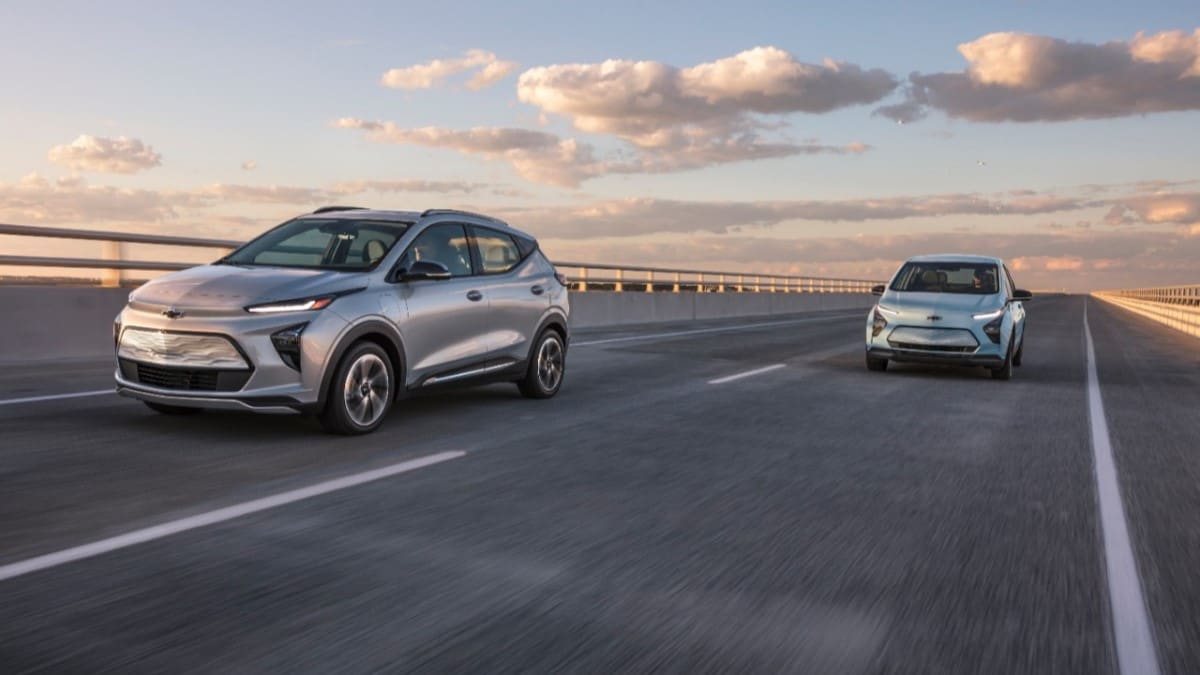
[ad_1]

The ongoing saga of the Chevy Bolt battery recall has a new twist. General Motors is offering compensation to owners of Bolt electric vehicles (EVs) from model years 2020-2022 who have not replaced the vehicle’s batteries.
A GM spokesperson told Electrek the company “is announcing a compensation program for 2020-22 Bolt EV and 2022 Bolt EUV owners upon installation of the final advanced diagnostic software as part of the original battery recall. Owners are eligible to receive a $1,400 Visa eReward card upon installation.”
To qualify for the payment, owners must install battery monitoring software before the end of 2023 and sign a legal release. What’s in the release? We don’t know. GM hasn’t released details to the press.
A Primer on the Battery Saga
The Chevy Bolt EV is a small electric hatchback first released for the 2017 model year. Chevy updated its design with new styling and upgraded cabin tech for the 2022 model year and introduced a slightly longer version with added cargo and rear-seat legroom, the Bolt EUV.
The Bolt siblings were Chevrolet’s first pure electric vehicles (EVs) since the company discontinued the EV1 in 1999. They use a unique battery that GM does not use in other electric cars. Newer GM EVs like the Cadillac Lyriq and Chevy Silverado EV use an entirely different battery chemistry.
That’s important because the Bolt’s battery proved problematic.
Chevrolet issued an escalating series of recalls of the two cars throughout 2021 after fire marshalls blamed Bolt batteries for several fires. We’re unaware of any injuries blamed on Bolt fires, but more than a dozen cars have caught fire. Several fires spread to structures where the cars were parked, sometimes starting hours after owners parked the cars.
Several Fix Attempts
Engineers from Chevrolet and battery maker LG spent months examining the problem and attempted several fixes.
At various points, GM warned owners to park their vehicles outside, at least 50 feet from other cars and recommended they not allow the battery to drop below 70 miles of range. This left owners with severely reduced range — unable to fully charge their cars or drive them for the limited remaining capacity.
The company ultimately replaced many Bolt batteries with a slightly different design that, to our knowledge, hasn’t triggered any fires. But replacing the batteries in every Bolt on the road is an incredibly expensive endeavor. As recently as the second quarter of this year, GM took an $800 million hit to its quarterly earnings over the issue.
An Advance on a Legal Settlement
GM has released a Frequently Asked Questions document, which says the money is an advance on a class-action lawsuit likely to settle soon. “Through this compensation program, members of the settlement class can choose to receive their settlement payments early, prior to preliminary or final approval of the settlement,” GM says.
Owners will have to sign a legal release to get it. “Given the amount offered, we feel a release is appropriate,” GM says.
The document doesn’t explain what rights owners will be asked to release.
Owners don’t appear to lose any rights by not agreeing to the offer. “ALL members of the putative settlement class who have had the Software Final Remedy installed will receive a payment via check, if and when the settlement is approved,” GM notes.
The Bolt’s Future
Chevrolet faces a conundrum with the Bolt name.
The Bolt is the best-selling EV in America not built by Tesla. That brings brand recognition and argues that Chevrolet should continue selling some version of the Bolt. Bolts currently on dealer lots use a different battery chemistry than those included in the recall.
But the publicity surrounding the recall also gives the Bolt name a black eye.
GM has seemed split on what to do with the model. Earlier this year, Chevy announced the model would be discontinued at the end of 2023. Shortly afterward, it announced plans to revive the name on a future model using the same battery as GM’s other electric cars.
[ad_2]